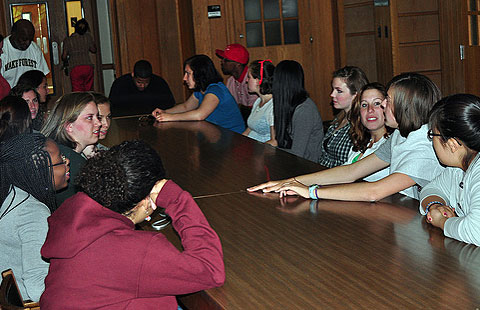Thirteen Colgate students are about to embark on a road trip that you’re not likely to read about on the AAA website.
It is a three-week travel course through the Deep South, a rolling examination of the repercussions slavery and Jim Crow laws have had on a region seeped in its own culture and traditions.
The trip is an extended study component of the course Social Stratification in the American South, taught by Angela Hattery and Earl Smith, visiting professors from Wake Forest University.
Seven Wake Forest students also are taking part in the field experience, which is the fourth trip led by the professors through some very poor and still largely segregated counties in Alabama, Mississippi, and Louisiana.
 |
| Colgate and Wake Forest students get to meet each other for the first time. |
The students will attend lectures by professors at Wake Forest, Duke University, and Mississippi State University. But they also will hear from local “experts” in the cities they visit, like Peggy Heidi, a teacher in Birmingham, Ala., who grew up in a neighborhood called Dynamite Hill.
|
That nickname stuck after court-ordered integration led to a series of bombings in the late 1950s and early 60s meant to intimidate blacks and force them out of the neighborhood.
Students also will visit the notorious Mississippi State Penitentiary, a k a Parchman Farm. Civil rights activists were jailed there in the early 1960s, and a litany of abuses against inmates eventually led a federal judge in 1972 to declare the prison an affront to “modern standards of decency.”
Students will hear from inmates and tour the prison’s gas chamber. (Capital punishment is a research interest of the professors’, and they recently hosted a wrongful convictions symposium at Colgate.)
Hattery said she expects that visiting the Deep South will be similar in some ways to a study-abroad experience for the Colgate students, none of whom are from the region.
They’ll get a taste of local foods, like stewed okra, and absorb regional music at Po’ Monkey’s, a sharecropper shack in Merigold, Miss., considered one of the last authentic Mississippi Delta juke joints. They will roll up their sleeves and work, volunteering three days for the Southern Mutual Help Association in New Iberia, La.
One of her Wake Forest students who took the course ended up returning to the region after graduation, joining Teach for America, said Hattery.
“Hopefully this experience will help students consider the bigger picture and think of the world in a different way,” she said.